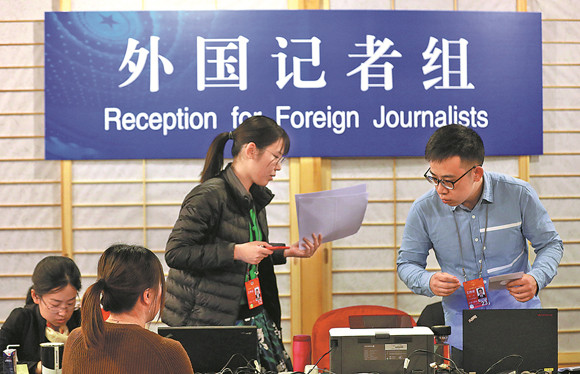
Staff members work at the media center that opened in Beijing on Tuesday for the upcoming first session of the 13th National People's Congress and first session of the 13th National Committee of the Chinese People's Political Consultative Conference, known as the two sessions. (ZHU XINGXIN / CHINA DAILY)
China's anti-graft system will see a fundamental change as the top legislature is scheduled to review a draft amendment to the Constitution and the country's first law on supervision to give legal footing to a new national supervisory commission.
Some 2,980 deputies attending the first plenary session of the 13th National People's Congress, starting on Monday, will deliberate on the two draft measures, according to the agenda.
Only a plenary meeting of the NPC can adopt amendments to the Constitution and laws related to the country's fundamental systems.
A major change proposed to the Constitution is to list the supervisory commissions as a new type of State organ.
The proposal says supervisory organs will be listed together with administrative, judicial and procuratorial organs of the State, all of which are created by the people's congresses, to which they are responsible and by which they are supervised.
The supervisory commissions will independently exercise their power of oversight and not be subject to interference by any administrative organ, public organization or individual, the proposal says.
The draft supervision law, reviewed by the NPC Standing Committee twice, in June and December, details how the supervisory commissions work, as well as their duties and obligations.
The law applies to all public officers, including civil servants and those working for public schools and medical institutes, which means that the nation's fight against corruption covers every public corner, experts said.
To better study how to operate the system, pilot supervisory commissions were set up in Beijing and in Shanxi and Zhejiang provinces in 2016. In October, the test was extended across the country.
By Sunday, the nation's 31 provinces, municipalities and autonomous regions had elected directors of their supervisory commissions.
The commission at each level integrates forces to fight corruption in government authorities, including anti-graft bureaus in people's procuratorates, and then works together with local disciplinary authorities of the Communist Party of China.
Such joint efforts have brought more public officers under supervision. For instance, about 2 million public officers are now under supervision in Henan province, up from 908,000 before the reform.
"The establishment of such commissions at provincial, city and county levels is a foundation to set up a national supervisory commission," said Ma Huaide, vice-president of China University of Political Science and Law.
He added that the draft, as well as the pilot program, will use the rule of law to guide the anti-corruption fight.
The draft has received lots of attention since it is designed to replace the practice of shuanggui, an intra-Party disciplinary practice in which CPC members under investigation must cooperate with questioning at a set time and place.
The decision to replace shuanggui with detention was declared during the 19th CPC National Congress in October to deepen reform of the country's supervision system.
Compared with the first version in June, the latest draft has specified procedures for detention and improved protection of the legitimate rights of graft suspects.
For example, the family and employers of detainees should be informed within 24 hours, and frozen assets should be released within three days of being found irrelevant to the case, according to the draft.
Guo Yong, a law professor at Tsinghua University, said such detailed rules can safeguard suspects' legitimate rights while also raising requirements for law enforcers.
Ma and Guo said the new mechanism will be crucial to boosting the country's fight against corruption.


















































